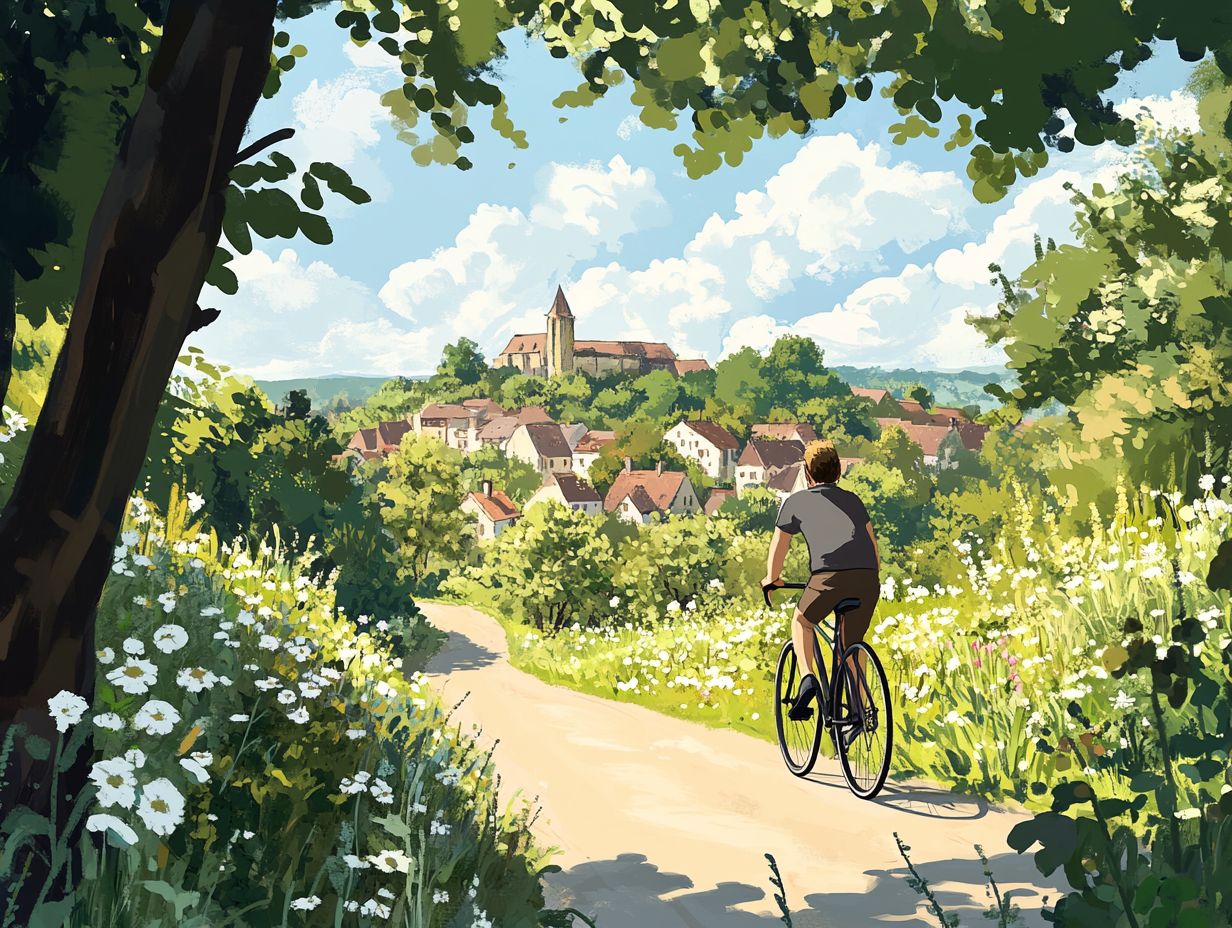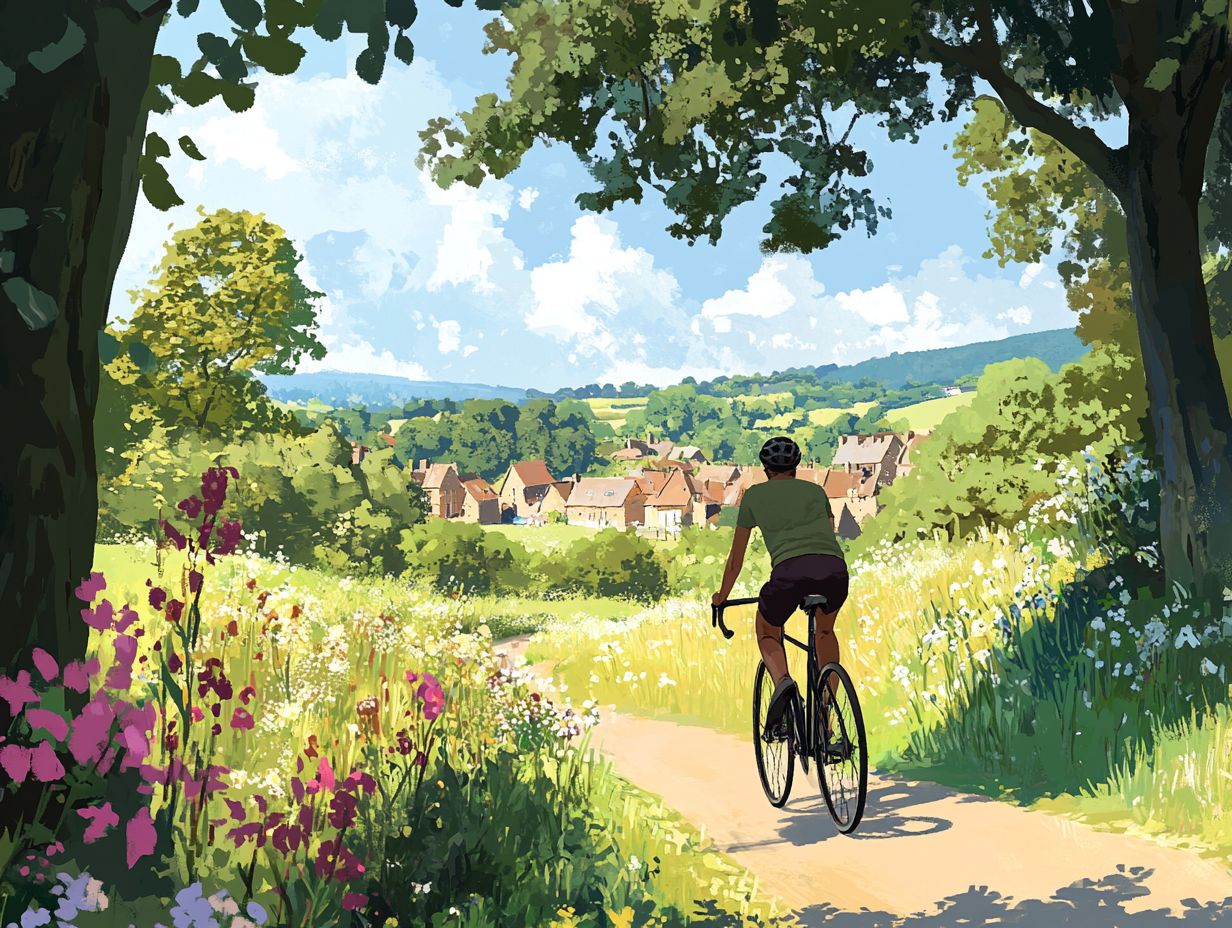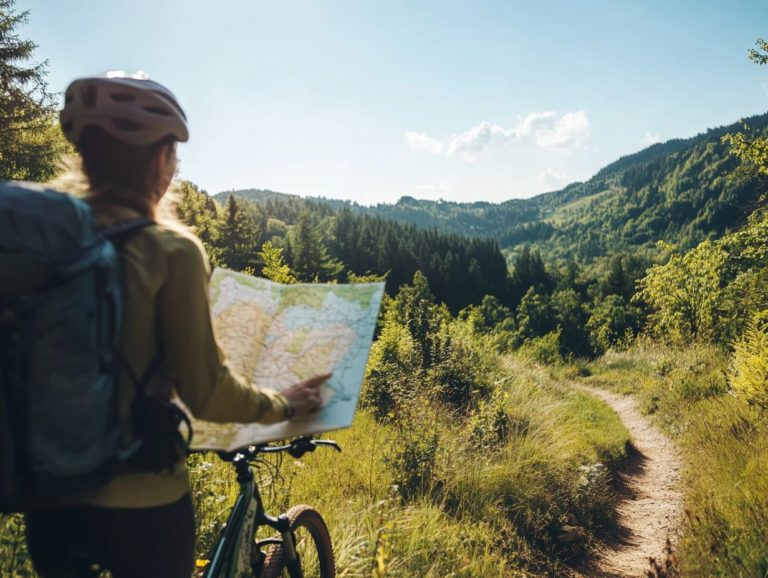The Benefits of Slow Travel for Sustainability
In a world that often rushes toward speed and convenience, the concept of slow travel invites you to pause and truly savor the journey. This thoughtful approach not only enhances your travel experiences but also champions sustainability, leaving a positive mark on both the environment and the local communities you visit.
By embracing the principles of slow travel, you can significantly reduce your carbon footprint, support local economies, and cultivate more meaningful connections. Discover how to weave this mindful travel philosophy into your adventures while navigating common challenges that may arise along the way.
Contents
- Key Takeaways:
- Understanding Slow Travel
- The Importance of Sustainable Travel
- Benefits of Slow Travel for Sustainability
- Reducing Carbon Footprint
- Supporting Local Economies
- How to Incorporate Slow Travel into Your Trips
- Tips for Planning and Choosing Destinations
- Challenges and Limitations of Slow Travel
- Frequently Asked Questions
- What is slow travel and how does it contribute to sustainability?
- How does slow travel benefit the environment?
- What are the social benefits of slow travel?
- How does slow travel benefit the local economy?
- What are the personal benefits of practicing slow travel?
- How does slow travel promote sustainability for future generations?
Key Takeaways:

- Slow travel reduces our carbon footprint and supports sustainable practices, making it a responsible choice for environmentally conscious travelers.
- By taking the time to fully immerse ourselves in a destination, we can support local economies and communities, promoting sustainable and ethical tourism.
- Incorporating slow travel into our trips may require some planning and adjustment, but the benefits for both the environment and local communities make it worth the effort.
Understanding Slow Travel
Understanding slow travel means embracing a mindset that prioritizes cultural immersion. This approach gives you the power to explore locally, uncover hidden gems, and savor local cuisine, all while championing environmental sustainability and promoting responsible tourism.
Instead of racing through destinations, slow travel invites you to adopt a more relaxed pace. This allows you to fully appreciate the beauty and diversity of the places you visit. In light of the COVID-19 pandemic, this mindset has gained significant traction, as many seek ways to reduce stress and forge meaningful connections with their surroundings. Embracing the benefits of visiting eco-friendly destinations can enhance this experience even further.
Defining the Concept
Slow travel is not just a style; it s a mindset that encourages you to take your time and truly immerse yourself in local cultures instead of merely ticking off tourist hotspots from a list. This approach invites you to explore your destinations deeply, fostering meaningful connections with the people, traditions, and customs you encounter along the way.
Unlike conventional travel, which often pushes you into packed itineraries and quick photo ops, slow travel allows you to wander at a leisurely pace. This not only enhances your appreciation for local artistry and cuisine but also paves the way for authentic interactions with residents. To further enrich your experiences, consider visiting sustainable travel destinations that prioritize environmental and cultural respect.
By prioritizing quality over quantity, you ll discover that these immersive moments often lead to unexpected discoveries and cherished memories that linger long after your visit has ended.
The Importance of Sustainable Travel
The significance of sustainable travel rests in its capacity to safeguard the environment, bolster local economies, and foster genuine connections between travelers and communities. This is crucial for anyone who wants to travel responsibly.
Environmental and Social Impact

The environmental and social impact of travel can be profound. Embracing sustainable tourism offers you a powerful framework to minimize negative effects while deepening your connection to the communities you visit. This approach tackles the impact our travel has on the environment think carbon emissions and habitat disruption while celebrating the rich cultural tapestries of each destination.
By engaging with local populations, you can make a meaningful contribution to the economy, ensuring that the benefits of tourism are shared fairly. Eco-tourism initiatives place a premium on the wellness of natural resources while empowering communities to preserve their unique identities. In doing so, you’re not just exploring diverse ecosystems; you’re also creating authentic experiences that foster a deeper understanding and appreciation of the benefits of slow travel and local traditions.
Benefits of Slow Travel for Sustainability
Slow travel presents a wealth of benefits for sustainability, inviting you to embrace meaningful experiences, experience reduced stress, and discover affordable travel options that often bolster local businesses.
Reducing Carbon Footprint
One of the primary advantages of slow travel is that it significantly reduces your carbon footprint. By embracing eco-friendly transportation methods like biking, walking, and public transit, you can minimize your environmental impact and immerse yourself in the local culture and landscape. This fosters a deeper connection to your surroundings.
Public transportation systems, such as trains and buses, often use greener technologies, which further aid in reducing emissions compared to driving your own car. Cycling and walking offer health benefits while alleviating congestion and pollution in urban areas. This ultimately creates a more pristine environment for future generations.
Embracing a slower pace allows you to appreciate the journey just as much as the destination, enriching your overall experience and supporting eco-friendly tourism initiatives.
Supporting Local Economies
Supporting local economies is an important part of your slow travel journey. When you choose affordable travel options that emphasize local businesses and cultural experiences, you explore and make a meaningful impact.
By prioritizing interactions with neighborhood shops, bustling markets, and inviting eateries, you forge genuine connections with locals. This makes your journey unforgettable while directly contributing to the community’s prosperity. For more insights, explore the benefits of responsible travel.
Such an approach fosters a true sense of belonging and ensures that the economic rewards circulate within the region, allowing small enterprises to flourish. Engaging with artisanal crafts and savoring locally sourced foods not only enhances your travel experience but also champions sustainable practices that might otherwise go unnoticed. For more insights, discover the benefits of eco-conscious travel.
In a time when mass tourism can dilute the richness of cultural identities, choosing to support local economies through slow travel for sustainability presents a unique opportunity to cultivate respect and appreciation for the diverse traditions and lifestyles that make our world so vibrant.
How to Incorporate Slow Travel into Your Trips

Incorporating slow travel into your adventures requires a thoughtful approach. This invites you to delve into local cultures and seek out enriching experiences.
Whether you’re enjoying a staycation or embarking on a longer journey, embracing this philosophy allows you to savor each moment and create lasting memories.
Tips for Planning and Choosing Destinations
When planning your slow travel itinerary, focus on travel tips that unveil hidden gems and local experiences, steering clear of typical tourist traps.
To truly immerse yourself in the essence of a destination, seek out places that reflect the local culture and community. Consider exploring quaint neighborhoods instead of bustling tourist hotspots, where charming cafes, artisanal shops, and vibrant markets await with authentic encounters.
Engaging with locals can lead you to discover off-the-beaten-path attractions, such as family-owned restaurants serving regional delicacies or smaller artisan workshops showcasing traditional crafts.
Opting for slower modes of transport, like biking or walking, reduces your carbon footprint and opens the door to spontaneous adventures and connections with your surroundings. This significantly enriches your travel experience.
Challenges and Limitations of Slow Travel
The allure of slow travel provides numerous advantages, yet it also comes with its own set of challenges and limitations to consider, particularly in light of the COVID-19 pandemic. Embrace slow travel today to make a positive impact!
Start planning your next adventure today!
Addressing Common Concerns
Addressing common concerns about slow travel often requires you to shift your mindset. Focus on connecting with the community and enjoying rich experiences instead of just convenience.
You might worry that a slower pace means missing out on popular attractions. But rethinking what makes a journey fulfilling can transform those misconceptions.
By immersing yourself in local cultures and enjoying local food, you uncover hidden gems. You also develop a deeper understanding of your surroundings, enriching your travel experience.
This approach promotes sustainable tourism, benefiting both the community and you as a traveler. Embracing this philosophy allows you to explore the world with open hearts and minds, making each trip truly unforgettable.
Frequently Asked Questions

What is slow travel and how does it contribute to sustainability?
Slow travel is an approach to experiencing a destination at a leisurely pace. It minimizes negative impacts on the environment and local communities while promoting cultural exchange and supporting local economies.
How does slow travel benefit the environment?
Slow travel reduces carbon emissions by using sustainable forms of transportation like biking or walking. It also encourages conscious choices, such as using reusable water bottles and bags, which cuts down on waste.
This travel style fosters meaningful interactions with local communities. It helps preserve traditional practices and supports indigenous cultures.
How does slow travel benefit the local economy?
By staying in locally-owned accommodations and supporting small businesses, slow travel boosts the local economy. This creates jobs and supports community well-being.
What are the personal benefits of practicing slow travel?
Slow travel allows for a deeper connection with your destination. It promotes mindfulness and relaxation, leading to a more fulfilling travel experience.
How does slow travel promote sustainability for future generations?
Choosing to travel slowly and making conscious choices sets an example for future generations. This helps preserve the world’s resources and encourages responsible travel.






